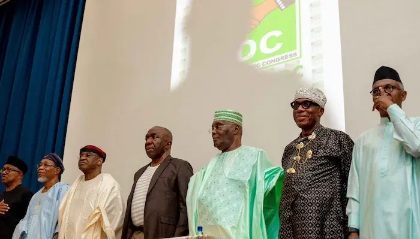In a bold and surprising political twist, the African Democratic Congress (ADC) has emerged as the rallying point for a fresh opposition coalition aiming to unseat President Bola Tinubu in the 2027 general elections. The announcement, made at the Shehu Yar’Adua Centre in Abuja, saw former Senate President David Mark and ex-Osun Governor Rauf Aregbesola named as interim chairman and secretary respectively, a lineup that raised both eyebrows and questions.
Founded in 2005 by Ralph Nwosu, the ADC was once a fringe party known more for its quiet presence than electoral success. Over the years, it has consistently fielded presidential candidates, yet has barely made a dent at the polls. Its most recent outing in 2023, with Dumebi Kachikwu as candidate, brought in just under 79,000 votes. Now, this same party is positioned as the savior of the fragmented opposition.
But is ADC a serious political force or just a convenient shell for old power players desperate to reclaim relevance? With key figures like Peter Obi and Chibuike Amaechi joining or endorsing the new coalition, some Nigerians see hope. Others, however, see a familiar pattern of opportunism and political prostitution. The ruling APC, which itself was a coalition in 2015, has mocked the move. Aviation Minister Festus Keyamo called it a “joke” and “the best path for APC to retain power.”

Critics argue that the coalition is built not on ideology or the will to serve, but fear. Fear of Tinubu’s growing grip on power, fear of political irrelevance, and fear of spending another four years in the wilderness. With internal crises like the leadership tussle between Ralph Nwosu and Patricia Akwashiki still unresolved, the ADC’s foundation seems shaky at best.
Meanwhile, Kachikwu, the party’s last presidential candidate, has rejected the coalition, calling it a hijack by political has-beens. This infighting suggests that rather than presenting a united front, the ADC may end up being the stage for another cycle of betrayal and manipulation.
As Nigeria hurtles toward 2027, the fear of Tinubu appears to be shaping the opposition’s choices more than vision or integrity. And with that, the ADC’s rise may not signal political rebirth but rather the deepening of political prostitution and elite slavery, where loyalty is rented, parties are swapped like jerseys, and the people remain spectators in their own democracy.
